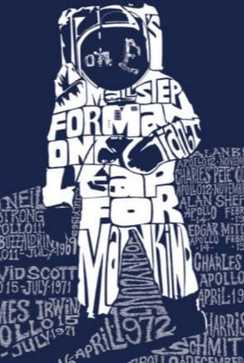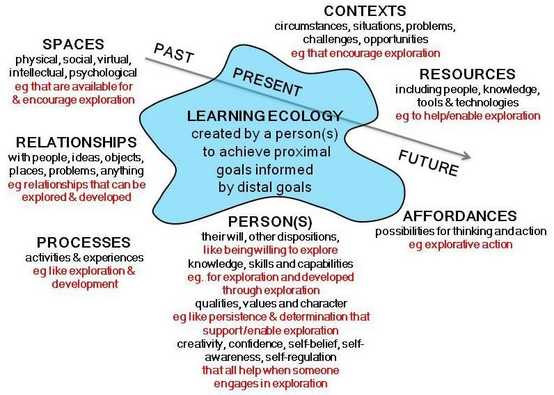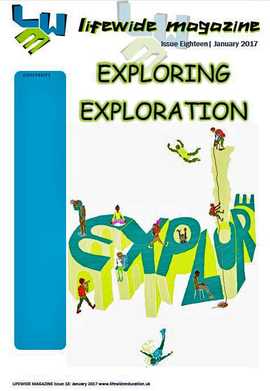
Exploration occurs in all non-sessile (not fixed) animal species. It's the way in which organisms make sense of their environment and change their environment if they have to. It's a fundamental part of an organisms ecology for surviving: an organism's life depends on the success of it's explorations to find food and water if they are a land animal, security (safe places to rest) and procreation (they need to find mates to propagate their species). Exploration is programmed into the DNA of life and is a fundamental process in the ecology of every organism and every ecosystem.
This goes for people too. The history of man is a history of exploration - countless small steps and few giant leaps. Only through exploration have we come to understand the world and the universe we inhabit. There is no other way of achieving this. Every period of history, every culture and every advance in knowledge and technology is the product of many explorations, many of which did not succeed, and often unique to an individual who was motivated to explore something that no-one else had.
To explore or the act of exploring are used as 'transitive verbs' to denote either 1) systematic investigation, study of, search for or analysis, testing or experimentation or 2) less systematic forms of searching eg. to look into something, to become familiar with, to get a sense of.... Exploration and exploring involve travelling physically, virtually and or cognitively or psychologically into places and spaces that are unknown or unfamiliar.
We explore to experience the world and to learn and understand it, and often ourselves, better. The number of contexts for exploration is only limited by our imagination and that is pretty limitless. My Christmas read this year is a book called ‘Pragmatic Imagination’(1) after I got through the glowing endorsements, of which there were many, I came across these words, ‘efficacy in the world today requires a productive entanglement of imagination and action’. I think nowhere is this productive entanglement more apparent than when we engage in exploration regardless of whether we are exploring the far reaches of the universe or are own limitations and capabilities: in fact the two are often interlinked. Indeed life itself is an exploration from the moment we play with our first toy to the moment we close our eyes for the last time.
Exploration can be a psychological process of examining ourselves, our own thinking, emotions, purposes and actions, and or a cognitive process of inquiry involving the investigation of ideas or problems in any subject or any context or circumstance. It can involve travelling through physical spaces and landscapes that are new to us, for example when we explore a new place. And it can involve journeys in and through new virtual environments, using technological tools that are new to us and the new social interactions they present. It can involve contexts and phenomenon in our unfolding present, reconstructions of the past or imaginings of the future.
Each discipline or professional domain develops its own tools and methodologies for conducting explorations that are relevant to its particular field of knowledge and practice. For example, I once practised as an exploration geologist searching for mineral deposits in western Saudi Arabia. I used satellite and airborne remote sensing techniques and prospecting methods on the ground, I mapped and recorded what I found on aerial photographs, I conducted geochemical surveys and all used all sorts of imagination and reasoning based on the knowledge I had acquired through study and my experiences while conducting exploration, but often finding something useful was a matter of chance, of putting myself into the areas of highest potential, of walking a little bit further up a dry river bed because I just had a feeling that I might discover something. And that sort of hunch or gut feeling drives a lot of what I call 'wandering with intent': mostly nothing comes of it but sometimes our persistence pays off and we discover something that is significant to us.
We explore when we innovate and we explore when we are not sure where to go next. Exploration underlies research and it underlies, what John Dewey called 'productive inquiry', 'finding out what we need to know in order to do the things we need to do'. Exploring is an attitude or orientation requiring the willingness to engage with things that are not known or are poorly understood. It may involve overcoming fear and anxiety and dealing with uncertainty but also unimagined affordance. Exploration involves a physical and mental journey as we venture into the unknown or unfamiliar and it requires courage, confidence and self-belief that we will be able to cope with whatever emerges. Being willing to explore, to put ourselves into unfamiliar contexts to deal with unfamiliar situations and problems is an important orientation that we need in life - especially when life is disrupted or when we need to break away from existing routines in order to develop.

The challenge for educators is to encourage learners to explore, to embark on journeys into what is unknown to them in order to learn. Given the way higher education is structured and assessed many might feel that we squeeze out much of the affordance for more explorative and discovery-oriented forms of learning, and this is the challenge educators face all over the world.
Developing students’ capability and capacity to explore is not simply a matter of developing the requisite knowledge and skills to explore in a particular domain. It also requires the building of confidence and attitudes, orientations and character like the willingness to take risks, to work with uncertainty and environments that are often not well ordered, to persist in the face of disappointment, and to try again if efforts fail to realise a goal. It also requires learners to harness their pragmatic imaginations to not only visualise a fuzzy goal but to imagine and turn into action the steps to achieving such a goal. To follow such a pathway without being sure of reward requires self-belief and trust in one’s own processes and practices. Learning environments that foster these imaginings and behaviours have become increasingly rarer as our higher education system and society for that matter has become more risk averse and where teaching efficiency and predictable outcomes are the most valued indicators of a quality education. Developing the explorative capacity of students is a challenge to educators and educational institutions all over the world, but it is something we have to do if we are to enable each new generation to solve the problems created by previous generations.

will help expand awareness of its importance in learning and in the achievement of goals.
As always we cannot produce our magazine without the generous contributions of our writers. I would like to sincerely thank all the contributors for sharing their thinking and personal experiences of exploration: by sharing your perspectives and insights I believe we are making a useful contribution to our understanding.
You can download a free copy of 'Exploring Exploration' Lifewide Magazine #18 from the magazine page. In the next issue of Lifewide Magazine (July 2017) we will focus on exploration in disciplinary and professional contexts and we welcome contributions from our readers. If you would like to contribute please get in touch.
Norman Jackson
Commissioning Editor Lifewide Magazine
Citations
1 Pendleton-Jullian and Seely Brown J (2016) Pragmatic Imagination
2 Jackson, N.J.Exploring Learning Ecologies LULU
3 Exploring Exploration Lifewide Magazine #18
 RSS Feed
RSS Feed
